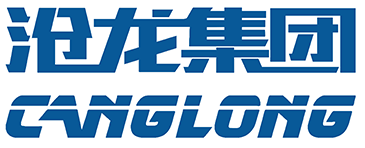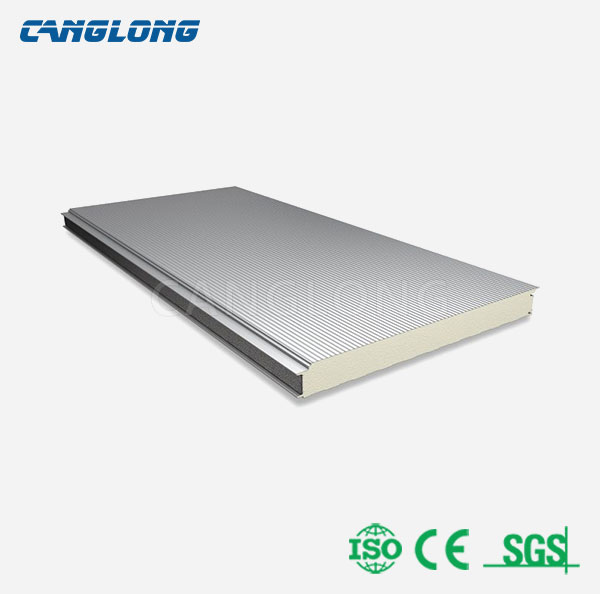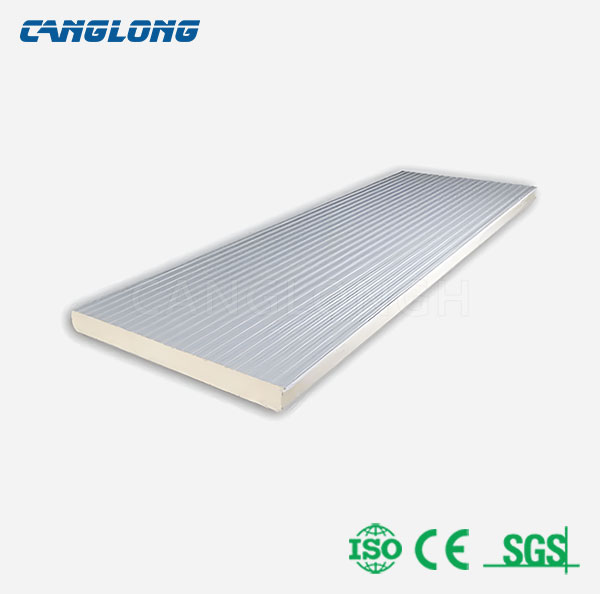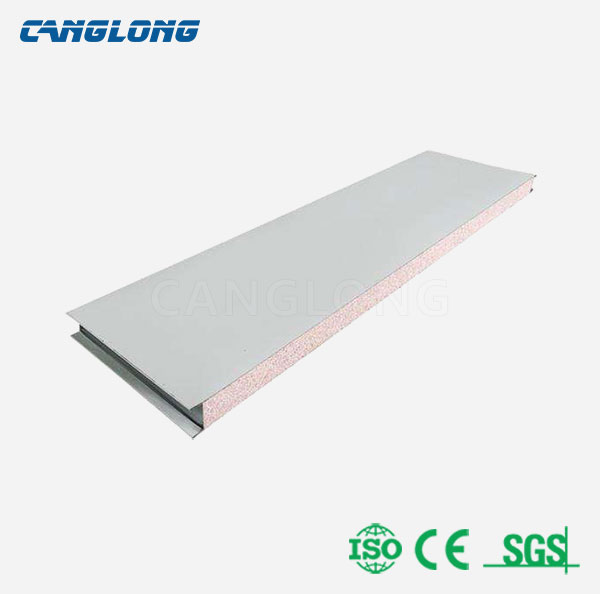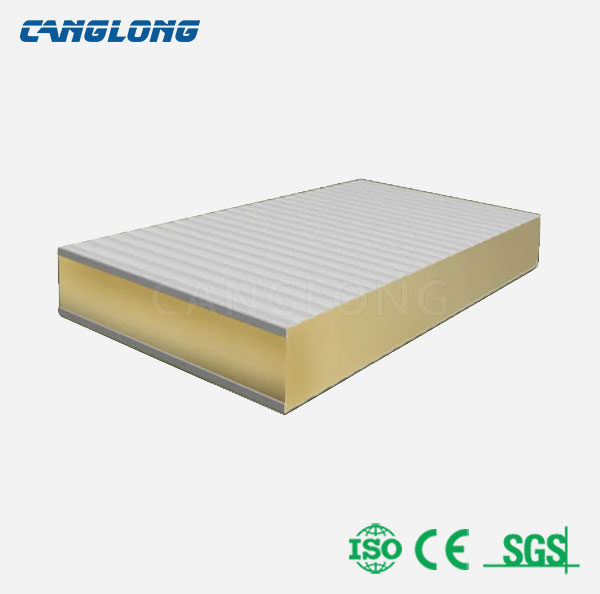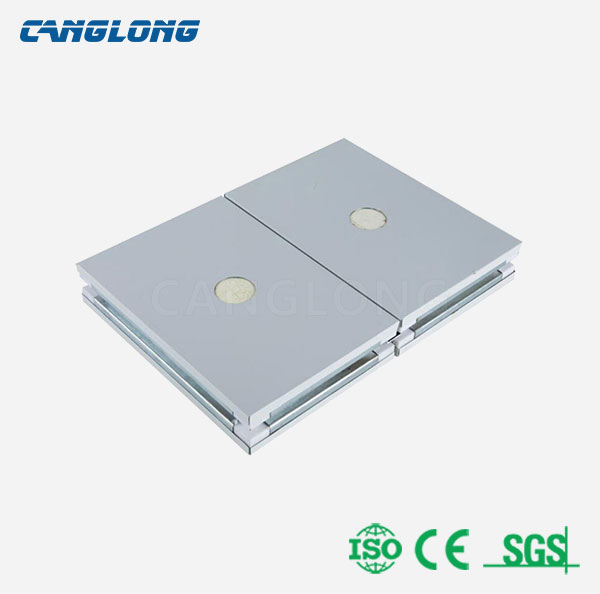
Clean Room Panel
- Effective Width: 950-1150mm
- Core Material Density: 38 to 45kg/m³
- Metal Sheet Thickness: 0.2mm to 0.8mm
- Core Material: EPS/PIR/PUR/PU/Rock wool
- Core Thickness: 50/75/100/120/150mm
- Thermal Conductivity: <0.022W/(m·k)
- Water Absorption: <0.30kg/m³
- Delivery Time: 7-15 days
- Shipping Port: Qingdao Port
- Payment: T/T, L/C, PayPal
- Service Life: ≥15 years
- Product Origin: Henan, China
Product Details
Clean room panel is essential components in the construction of controlled environments, designed to minimize contamination and maintain specific air quality standards. These panels are widely used in industries such as pharmaceuticals, biotechnology, electronics, and aerospace, where even the slightest contamination can compromise product quality and safety.
Clean room panels are vital for creating controlled environments that meet stringent cleanliness standards across various industries. Their unique characteristics, combined with the benefits they offer, make them indispensable in applications where contamination control is critical. By investing in high-quality clean room panel and maintaining them properly, organizations can ensure the safety and efficacy of their products and processes, ultimately supporting better outcomes in health, technology, and safety.
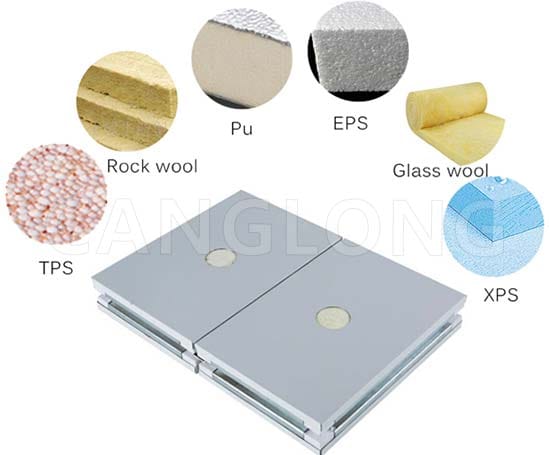
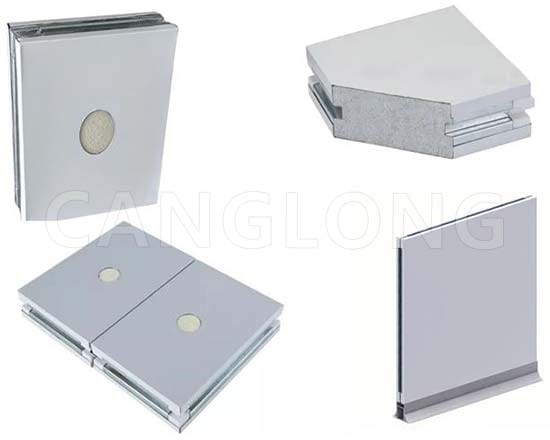
Key Characteristics
- Material Composition: Cleanroom panels are typically made from materials that are easy to clean and resistant to microbial growth, such as stainless steel, aluminum, or specialized composite materials. The surfaces are often smooth and non-porous to prevent dust accumulation.
- Modular Design: Many clean room panels are designed in modular sections, allowing for easy installation and reconfiguration. This flexibility is crucial for adapting to changing space requirements.
- Insulation: Clean room panels often incorporate insulation to maintain temperature and humidity levels, which is critical for sensitive processes and products.
- Sealing and Joints: The edges and joints of cleanroom panels are designed to minimize gaps, ensuring an airtight seal that prevents contamination from outside sources.
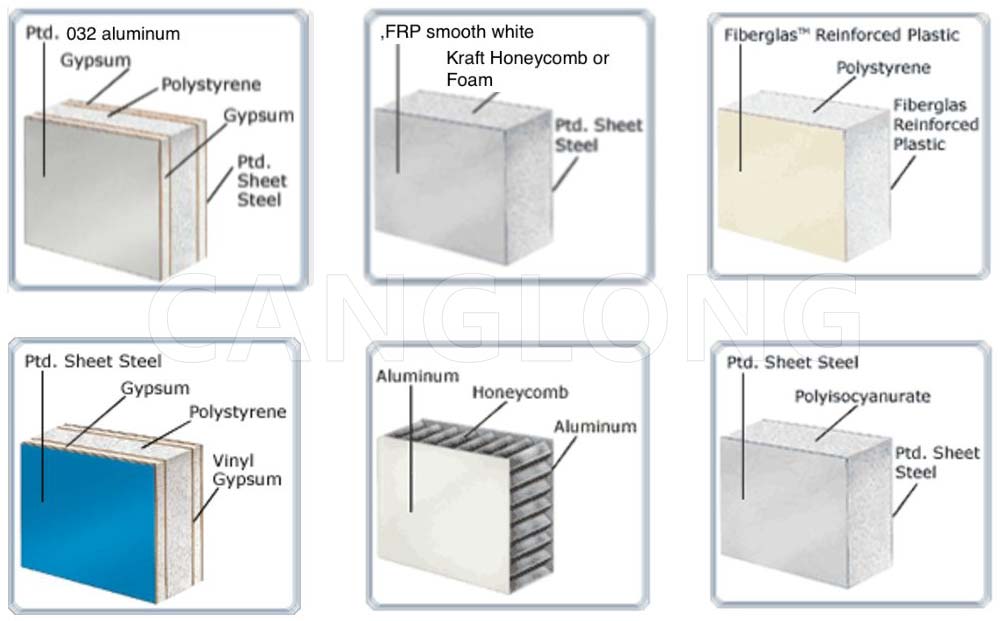
| Thickness | 50/75/100/120/150(mm) |
| Effective width | 950, 980, 1150(mm) |
| Length | According to customer’ s request, less than 11.8m |
| Materials | Polystyrene foam board, Steel sheet |
| Structure | Upper and lower layer: Color steel sheet, Aluminum |
| Middle: EPS/PU/XPS/TPS/Rockwool/Glass Wool | |
| EPS density | 10/12/14/15/16/18/20 kg/m³ |
| Conventional color | White, sea blue, red etc. |
| Lifetime | More than 60 years |
| Performance | Light weight, heat insulation, water resistant, green and environmental |
| Usage | Roof, Wall, Ceiling, Partition |
Applications of clean room panel
- Pharmaceutical Manufacturing: Clean room is essential in the production of drugs and vaccines, where the presence of contaminants can jeopardize safety and efficacy.
- Electronics: In semiconductor manufacturing, clean rooms help prevent dust and particles from interfering with sensitive electronic components.
- Biotechnology: Clean room panels are used in labs where biological research is conducted, ensuring a sterile environment for experiments.
- Aerospace: Clean rooms are critical in the aerospace industry for manufacturing and assembling components that require a high level of cleanliness.
- Food Processing: Clean room boards can also be applied in food production facilities to maintain hygiene and prevent contamination.
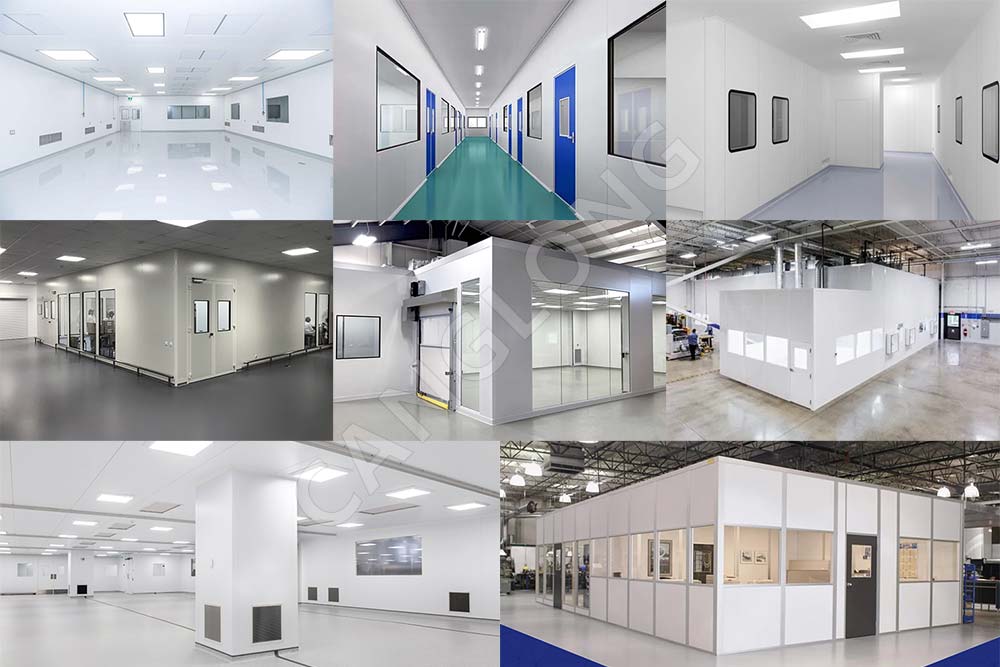
Advantages of clean room panel
- Contamination Control: The primary benefit of clean room panel is their ability to control particulate and microbial contamination, essential for maintaining the integrity of sensitive processes.
- Ease of Cleaning: The smooth surfaces of clean room panels facilitate easy cleaning and disinfection, helping to maintain the required cleanliness standards.
- Energy Efficiency: Many cleanroom panels are designed with insulation that helps maintain stable temperatures, reducing energy costs associated with heating and cooling.
- Durability: Constructed from robust materials, clean room boards are designed to withstand the rigors of industrial environments, ensuring long-lasting performance.
- Customization: Clean room panels can be customized to meet specific regulatory standards and operational needs, making them suitable for a variety of applications.
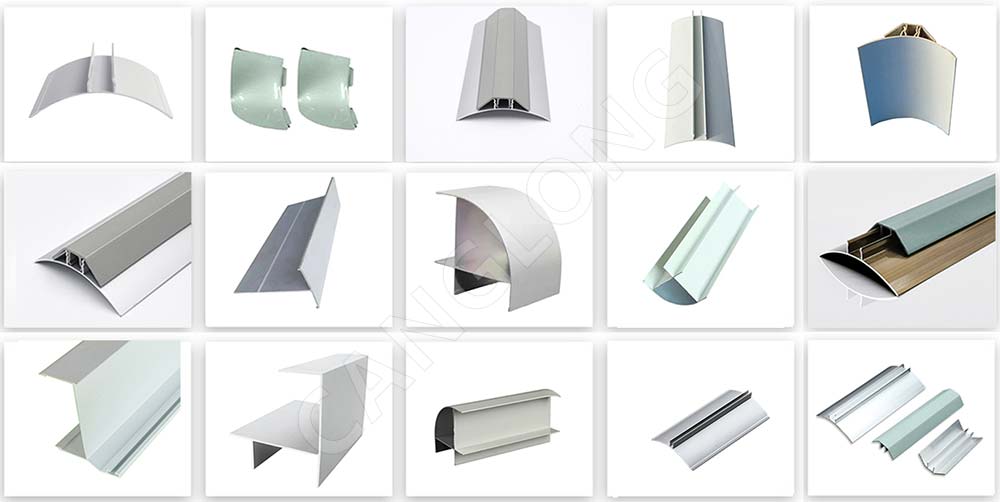
Partial Clean Room Aluminium Profile Types Display
Maintenance
Maintaining clean room panel is crucial for ensuring their effectiveness:
- Regular Cleaning: Establish a routine cleaning schedule using approved disinfectants to maintain hygiene standards.
- Inspection: Periodically inspect panels for any signs of damage, wear, or contamination, and address any issues promptly.
- Seal Integrity: Check the seals and joints regularly to ensure they remain airtight and effective in preventing contamination.
- Replacement: If panels become damaged or compromised, they should be replaced to maintain the integrity of the clean room environment.
Sandwich Panel Production Workshop

Sandwich Panel Packing & Shipping
All the products are loaded at the loading site of our factory using crane and forklift by our skilled workers, who will prevent the goods to be damaged. And all the structure components, panels, bolts and sorts of accessories will be well packed with standard package and it is suitable for ocean transport.
Inspection: 50% inline inspection and 100% full final inspection, make sure all output w/o any mistake.
Packing: Per customer's requirements or per product sizes, full protection packing.
Shipping: Per customer's requirements or per container sizes.
Unloading: We package it as a whole and can be easily pulled out at once with a forklift, which is very convenient.

Our Certificates
Our sandwich panel certificates include EU CE certification, BPS certification, and ICC certification.

Application of Sandwich Panels
Usage scenario: Insulated sandwich panels are used as exterior walls and interior partitions, installed vertically or horizontally on single span or multi span structures. Such as industrial buildings, steel frame structures, warehouses and logistics centers, commercial buildings and offices, fire-resistant buildings, agricultural and livestock buildings, sports halls, exhibition halls, factories, garages, hangars, barns, prefabricated houses, cold storage, clean room, etc.

We provide the following RAL color card colors for your reference. For other colors, please compare the Raul color card colors.
Note: The above color card has a slight deviation due to printing reasons, please refer to the actual products.


If you purchase metal sandwich panels from Canglong Group, we will also provide some accessory products, including self tapping nails, rivets, waterproof caps, polyurethane glass glue, mouth and corner accessories, outer ridge tiles, waterproof eaves, external and internal corners, eaves edging, plugs, door and window edging, purified aluminum profiles, etc.




High-quality Raw Materials
We strictly select high-quality suppliers. All color steel coils and core materials are from China top 500 companies and have undergone strict quality inspections to ensure the basic quality of the products.
-

Advanced Production Equipment
The factory is equipped with advanced production equipment, including automated production lines, cNc cutting machines and high-precision pressing equipment, to ensure that the production process of each color steel sandwich panel is accurate and stable.
-

Mature Supply Solutions
One-stop supply of all accessories for sandwich panel installation, standardized packaging process, to avoid friction or damage of sandwich panels on the road, easy for customers to unload, saving time and money for customers.
-

Q1: What are the main applications of polyurethane sandwich panels?
A: Polyurethane sandwich panels are commonly used for insulation and construction in various building types, including residential, commercial, industrial, and agricultural structures. They are suitable for walls, roofs, ceilings, and floors.
Q2: What are the advantages of polyurethane sandwich panels?
A: Polyurethane sandwich panels offer excellent thermal insulation properties, lightweight construction, high strength-to-weight ratio, versatility, weather resistance, fire resistance (with appropriate treatments), aesthetic appeal, and cost-effectiveness.
Q3: How do polyurethane sandwich panels contribute to energy efficiency?
A: Polyurethane sandwich panels provide effective thermal insulation, reducing heat transfer through walls and roofs. This helps maintain comfortable indoor temperatures and reduces the energy required for heating and cooling, thus contributing to energy efficiency and lower utility bills.
Q4: Are polyurethane sandwich panels environmentally friendly?
A: Polyurethane sandwich panels can be environmentally friendly when produced using sustainable manufacturing practices and materials. Additionally, their energy-saving properties contribute to overall environmental sustainability by reducing energy consumption and greenhouse gas emissions.
Q5: How durable are polyurethane sandwich panels?
A: Polyurethane sandwich panels are known for their durability and resistance to various environmental factors, including weather, moisture, and corrosion. Proper installation and maintenance can further enhance their longevity.
Q6: Are polyurethane sandwich panels easy to install?
A: Yes, polyurethane sandwich panels are relatively easy to install compared to traditional building materials. Their lightweight nature and standardized dimensions facilitate quick and efficient installation, resulting in reduced construction time and labor costs.
Q7: Can polyurethane sandwich panels be customized?
A: Yes, polyurethane sandwich panels can be customized to meet specific design requirements, including color, finish, thickness, and profile. Customization options allow architects and builders to achieve desired aesthetics and performance characteristics for their projects.
Q8: How do I maintain polyurethane sandwich panels?
A: Maintenance requirements for polyurethane sandwich panels are minimal. Regular cleaning with mild detergent and water, inspection for any damage or deterioration, and prompt repair of any issues are recommended to ensure optimal performance and longevity.
Product Features
The metal sandwich panels produced by Canglong are insulated, fire-resistant, environmentally friendly, earthquake resistant, and durable.
